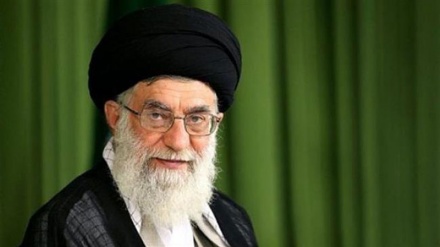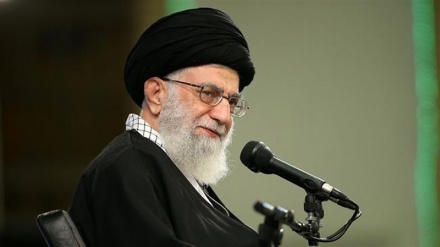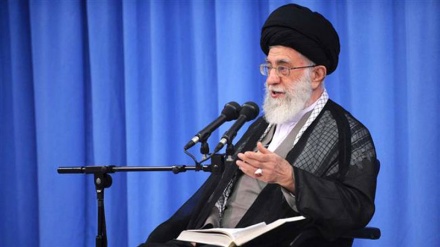In Presence of the Sun (66)
If you remember we had already discussed the issue of justice in view of Ayatollah Khamenei. This time we are going to dwell again upon the importance of this issue with a focus on the role of the officials and their duty in the spread of justice.
Justice is a concept that has been focused by not only the divine religions but other creeds as well. 29 ayahs or verses of the holy Qur’an speak of justice. 290 ayahs also note the issue of injustice and oppression. The Leader of the Islamic Revolution says, “All efforts and struggles are for the sake of maintaining justice in the society; for if justice is maintained the rights and dignity of human will be maintained and human beings will reach their rights and freedom, too. Justice is not something to be replaced by anything else.”
Social justice is the one which every individual enjoys it. Through the course of history a lot of efforts have been made to set up justice. It is evident that justice has been the desire of every individual and nation. The Iranian nation, too, staged a revolution some 50 years ago which triumphed in 1979. No doubt the main goal of the revolution was to break the shackles of tyranny and despotism and take the country out of the yoke of foreign domination. Leader of the Islamic Revolution says, “Today in the Islamic system- the system that has been established by the name of Islam in the country- what is the most important issue which should be noticed more than anything else? Justice.”
Since the beginning of the Islamic Revolution in Iran strenuous efforts have been made for the welfare of various strata of the society but it is a very arduous path. Ayatollah Seyyed Ali Khamenei, addressing the officials, says, “Fairly speaking, many things have been done for implementing justice but it is not satisfactory. What we need and pursue is the maximal justice rather than an acceptable quantity. We want that no oppression exists in the society. There is a big distance till this phase. Thus, we should try. We must establish justice and morality and make our society Islamic in the real sense. This requires work, endeavour, faith, righteous deed and struggle in the way of God… otherwise justice won’t be established in any place of the world with the language of advice.”
The Leader stresses, “The most important duty of the officials is to materialize justice in the society so that the people feel justice; justice in law, justice in judgment, justice in distribution of vital resources of the country, justice in enjoyments and access to the facilities of the country by every individual.”
Establishment of justice is a tough job. In the view of Ayatollah Khamenei it should be carried out by the efficient, rational and religious people. He believes that there is a close relation among justice, spirituality and rationality.
Although the judiciary is the main organ to establish justice and take the right of the oppressed from the oppressor; the Leader of the Islamic Revolution maintains that the behavior and lifestyle of the officials, especially the top ones, is very effective in this regard. In view of this, he refers to aristocracy and luxurious inclinations as the hindrance of justice in society. Ayatollah Khamenei states, “One of the things that slowdown in society the movement toward justice is the manifestation of aristocracy among the top officials. Aristocracy has two defects. The second is greater than the first. The first defect of aristocracy is extravagance. We speak of halal aristocracy; i.e. what has been obtained via halal means and rightfully. Extravagance in society requires unequal distribution of wealth and damaging public properties and divine bounties. But the second defect is worse since it builds culture. It means that it makes something for all to contest. Of course, the top officials and TV have a major role in this regard. My conduct and your conduct have a major role.”
Imam Khomeini, too, didn’t like aristocratic demeanour and always supported the downtrodden and deprived classes. Ayatollah Khamenei elaborates on this trait of Imam Khomeini, “He used to prevent everybody from behavior of the nobility and aristocracy. He would repeatedly stress that we should trust in the loyalty of the weak strata. The Imam used to say this repeatedly. He stressed proper consumption of public property; emphasized on shunning extravagance. This is one of the basic lines. The issue of social justice, supporting the deprived and keeping aloof from the habit of aristocracy and luxury and practicing in this direction were the obvious characteristics of Imam Khomeini.”
Although establishment of justice is the main duty of officials; people should also demand it. Demanding of justice is recommended in Islam and this religion reprimands reticence against injustice. Leader of the Islamic Revolution says, “The issue of seeking justice is very important and has many branches. It shouldn’t be confined to mere name and should be really pursued.”
Then the Leader points to the vividness of the discourse of justice, saying, “We want the discourse of justice to be alive and a discourse that is always present at the scene. Among the elites, the officials, the people, especially the new generations, the name of justice and issue of justice must be always put forward as a main issue.”
Now, the establishments of students closely monitor the issue of justice. They keep an eye on the practice and lifestyle of the officials. The Leader, welcoming this trend, says to the students, “Dear youths, the flag of justice-seeking has always been carried by the divine messengers and their true followers. Today and always, struggle under this flag will be the most honest sign of following the divine messengers.”
Ayatollah Khamenei, pins hope in the reappearance of the Awaited Mahdi and establishment of global justice by him, saying, “In a world that is run on the basis of oppression, if we can keep the banner of justice hoisted; the hearts of nations- even the non-Muslim nations- will be attracted as everybody is thirsty of justice.”
RM/ME


